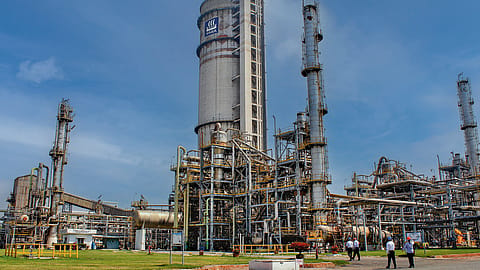‘Phygital’ Works Wonders for Yara India
The crop nutrition company has moved away from a product-centric approach to connect its workforce with farmers.

This story belongs to the Fortune India Magazine April 2023 issue.
ONE DOESN'T NORMALLY associate “a company of millennials with an increasing female workforce and a very strong digital mind” with an entity that sells fertilisers to Indian farmers!
But that is how managing director Sanjiv Kanwar describes Yara Fertilisers India or Yara India, a subsidiary of Norwegian multinational Yara International, which sells high-value fertilisers and micro-nutrients to farmers. Its mainstay commodity urea business accounted for around 75% of its ₹4,444 crore annual revenue in FY22. Other growth drivers include premium crop nutrition products for grapes, apples, bananas, oranges, sugarcane, potato and cabbages.
Yara India, which offers expert crop advisory through its agronomist field force, was one of the first companies to mainstream digital tools to manage and grow its business. In fact, it is this ‘phygital’ (physical + digital) connect with farmers which differentiates it from competitors. While its field force connects with 1 million-plus farmers physically every year, another 9 million are connected digitally. In-house apps provide agri advisory to farmers and retailers through videos and text messages. While loyalty app YaraConnect helps retailers with knowledge about what to recommend to farmers based on the crop cycle, App Farm Care provides hyper-local weather updates for individual farms. Yara Bodega, a digital marketplace which will bring retailers and farmers on to the same platform, is work in progress.
“We have been farmer-centric from day one,” says Kanwar. “We don’t train our people to sell what is in the warehouse, but the right stuff at the right time to farmers. There is no point in selling a calcium product when nitrogen is what the crop needs. The use of digital technologies is fundamental to this approach.”
“Our premium products maximise value for farmers. In the last three-four years, our market share in the segment has grown to over 40% and the ambition is to grow sales volumes three-fold by 2025,” he adds.
The company’s shift from a product-centric approach to farmer crop cycles and production has been futuristic. “I can make money in a sustainable manner only if the farmer is going to make money. We have 250-260 sales agronomists working in the marketplace. They have identified crop clusters, key routes on which the clusters exist, and they operate only in those markets. It brings consistency on how we approach the market,” adds Kanwar.
Pratik Tholiya, a Mumbai-based analyst with stock broking firm Systematix Shares and Stocks (India) Ltd., says Yara brings a lot of its MNC experience to India. “Conventional fertiliser companies usually provide agri inputs and agri machinery, but Yara engages farmers in a different way. The company has been at the forefront of a lot of things like the way they engage with farmers and teach them best practices.”
More Stories from this Issue
Another area is DEI (diversity, equity and inclusion). Not many fertiliser companies have a clear plan to increase female employee strength in field force. According to Yara India’s Sustainability Report 2022, out of its 139 new recruits, 28% are women who have been assigned frontline field jobs. “Yara India has added six women executives to its sales team and aims to strengthen the count. Our pool of experienced agronomists includes five women, all PhDs in agriculture-related areas, who conducted 1,150 online sessions and supported over 1.5 million farmers across the country during the reporting period,” it said.
The company, which has close to 750 employees across its offices and field forces, reports 80% talent retention. Digital interventions are making life easier for employees as it drives transparency and pace, says Kanwar. For instance, Yara India’s app for its commercial team, Go Beyond, charts work routes for its sales teams, records sales and has complete customer knowledge on its system, including credit lines, stock availability etc. Teams are able to take decisions on the go with minimum intervention from managers. Go Beyond also syncs seamlessly with SAP in the backend, managing warehouses as well as the entire spectrum of credit. “When you have a big team, 50% of the organisation chases the other 50%, so we have digitised those data points. Attendance is registered through Go Beyond. Orders are taken, credit (of retailers) is tracked, same day updates of dealer visits and farmer meetings captured. We have the attendance and ordering sorted out, the third piece will be in place in two to three months,” says Kanwar.
Yara India has 15,000-17,000 retailers connected to its products and services. There are around 9 million farmers within its network. The company is looking to connect with 25 million farmers and 30,000-35,000 retailers by 2025. “If farmers have a good product, buyers will come to them. If we enable them to do that, they will wait for our products and service offerings,” says Kanwar.